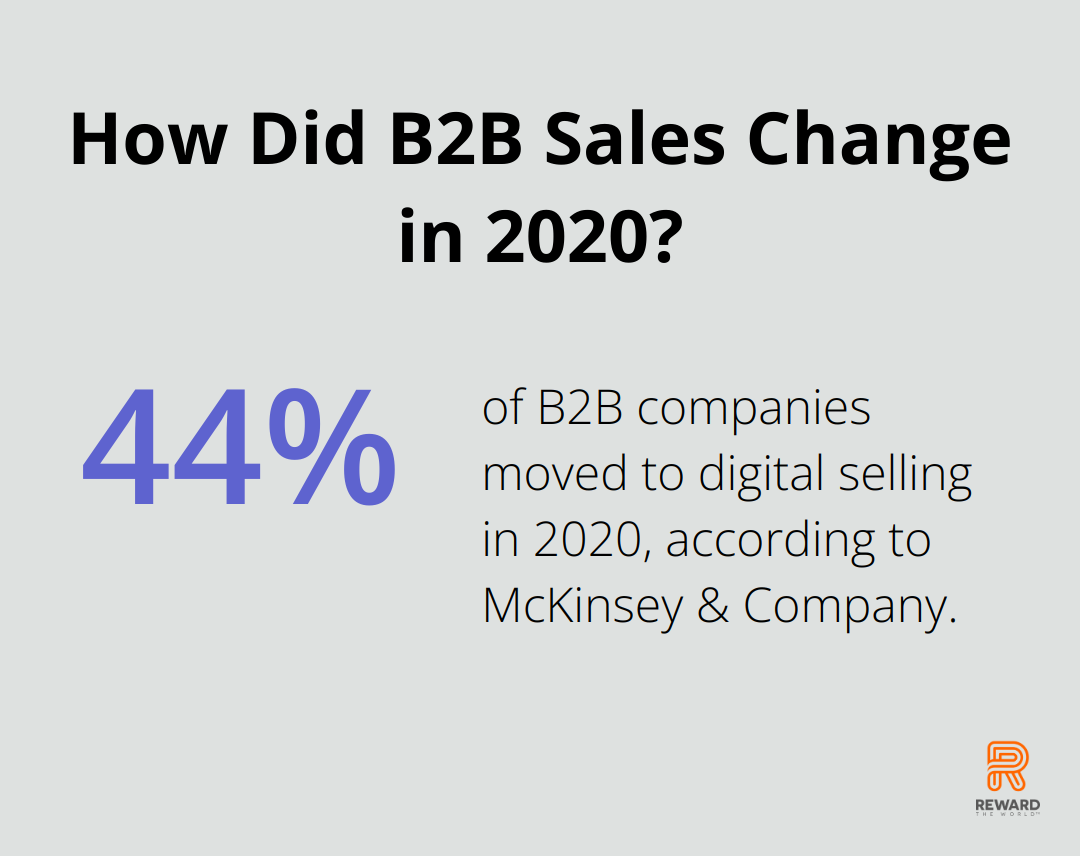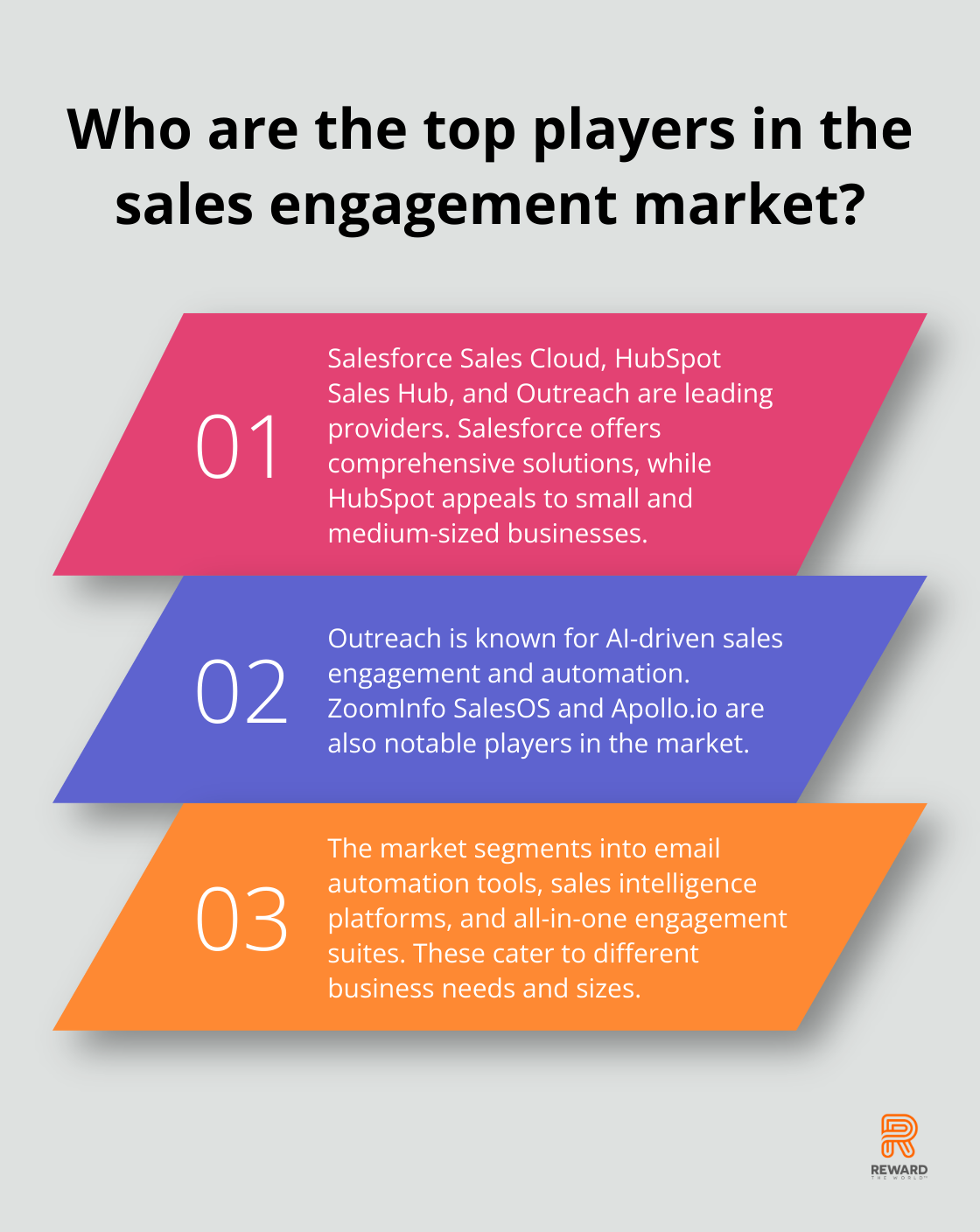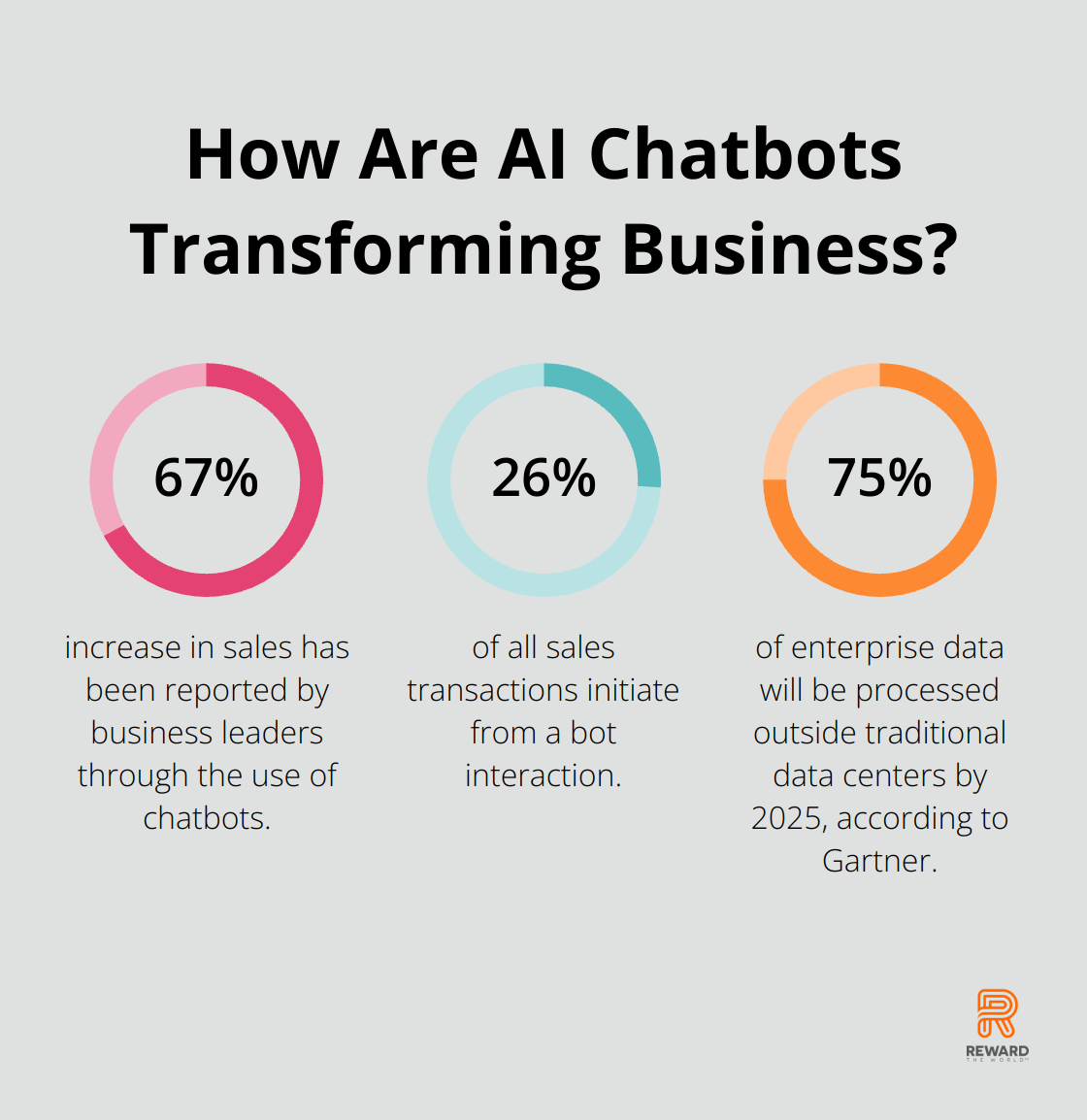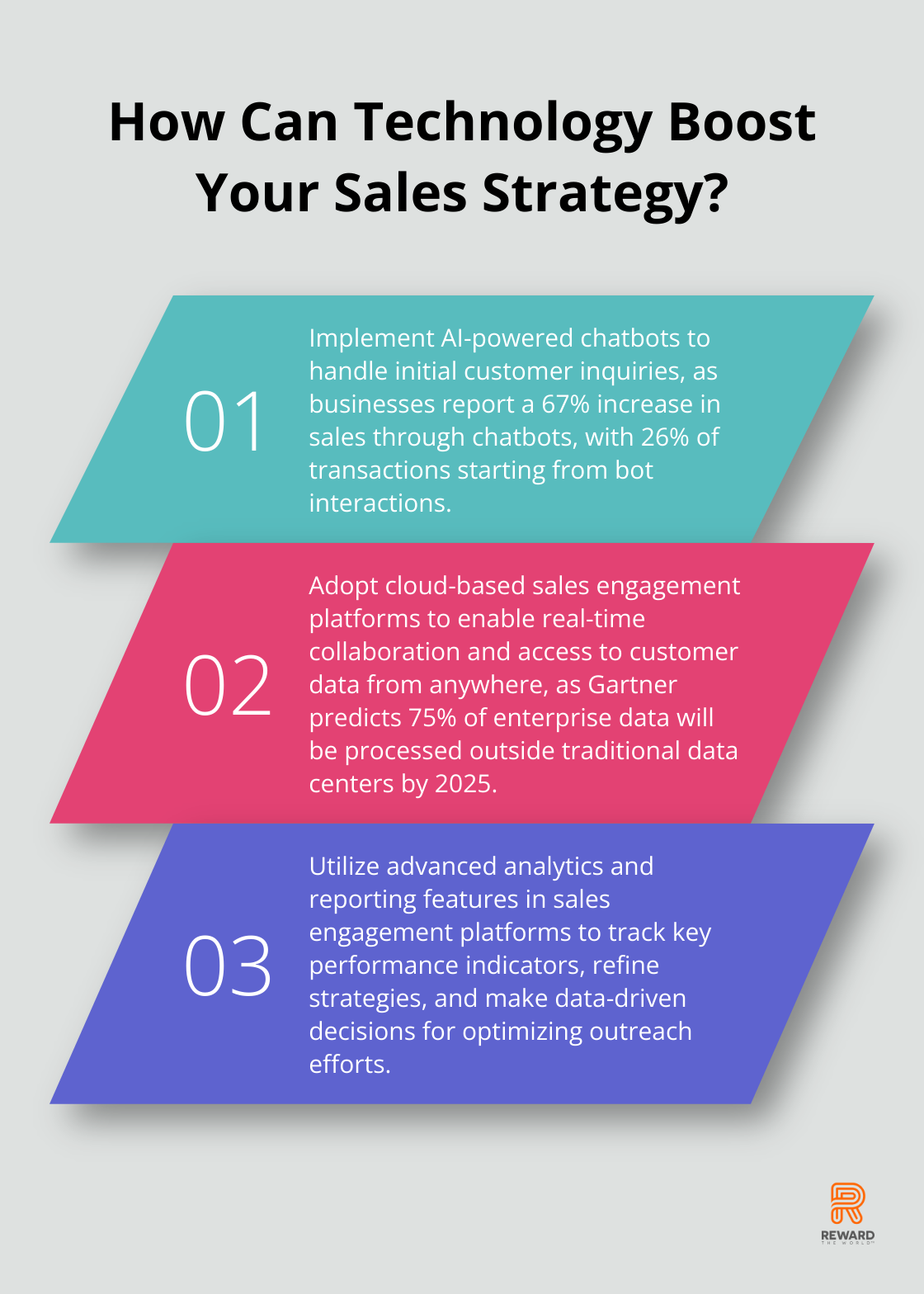
The sales engagement market size has exploded in recent years, reshaping how businesses connect with customers. At Reward the World, we’ve witnessed firsthand the transformative impact of these technologies on sales processes and outcomes.
This blog post delves into the current state of the market, exploring key players, growth drivers, and emerging trends. We’ll also examine how technological advancements and changing customer expectations are fueling this rapid expansion.
How Big Is the Sales Engagement Market?
Market Valuation and Projected Growth
The sales engagement market has experienced explosive growth in recent years. The global sales engagement platform market reached $7.87 billion in 2023. Projections indicate a surge to $29.62 billion by 2033, representing a compound annual growth rate (CAGR) of 14.2% over the next decade.
Key Growth Drivers
Several factors propel this rapid expansion:
- Digital Selling Shift: The COVID-19 pandemic accelerated the transition to virtual sales interactions. McKinsey & Company found that 44% of B2B companies moved to digital selling in 2020, a trend that continues to drive demand for effective remote engagement tools.
- Complex Buyer’s Journey: Forrester’s research reveals that the number of buying interactions has increased from 17 to 27. This complexity necessitates more sophisticated engagement strategies and robust platforms to manage multiple touchpoints effectively.
Regional Market Breakdown
The North America region registered the highest revenue share in the market in 2022. This is due to the encouraging government policies that promote the adoption of advanced sales technologies and the presence of major industry players.

Europe follows as another significant market. The region’s strong focus on data privacy and compliance (particularly with regulations like GDPR) has spurred the adoption of secure and compliant sales engagement solutions.
Industry Adoption Trends
B2B sectors spearhead the adoption of sales engagement platforms. Technology companies, financial services, and healthcare actively implement these solutions to streamline sales processes and improve customer interactions.
The integration of loyalty and incentive programs with sales engagement strategies has gained traction. This trend underscores the growing recognition that effective engagement transcends communication – it creates meaningful, rewarding experiences for customers throughout their journey.
As the market continues to evolve, we expect to see new players emerge and existing solutions expand their capabilities. The next section will examine the key players shaping the sales engagement landscape and how the market segments across different product types and industries.
Who Dominates the Sales Engagement Market?
Key Players in the Industry
The sales engagement market features several dominant players. Salesforce Sales Cloud, HubSpot Sales Hub, and Outreach consistently rank among the top providers, each offering unique features to meet diverse business needs.

Salesforce, a pioneer in customer relationship management (CRM), has developed robust sales engagement tools. Their Sales Cloud platform integrates with other Salesforce products, providing a comprehensive solution for businesses of all sizes.
HubSpot’s Sales Hub has gained significant traction, particularly among small to medium-sized businesses. Their user-friendly interface and strong focus on inbound marketing strategies appeal to companies looking to align their sales and marketing efforts.
Outreach has quickly established itself as a leader in AI-driven sales engagement. Their platform’s emphasis on automation and data-driven insights has made it a favorite among tech-savvy sales teams.
Other notable players in the market include ZoomInfo SalesOS and Apollo.io, which have also gained recognition for their sales engagement capabilities.
Product Types Shaping the Market
The sales engagement market segments into three main product types: email automation tools, sales intelligence platforms, and all-in-one engagement suites.
Email automation tools focus primarily on streamlining and personalizing email communications. These solutions appeal to small businesses and startups looking to scale their outreach efforts.
Sales intelligence platforms provide in-depth data and insights on potential leads. B2B sales teams rely on these tools to identify and engage high-value prospects effectively.
All-in-one engagement suites offer a comprehensive approach to sales engagement. These solutions integrate various features, including email automation, sales intelligence, and loyalty programs, providing a holistic view of the customer journey.
Industry-Specific Adoption Trends
While sales engagement platforms have found applications across various sectors, certain industries have emerged as early adopters and power users of these technologies.
The technology sector leads in sales engagement adoption. Software-as-a-Service (SaaS) companies, in particular, rely heavily on these platforms to manage their often complex and lengthy sales cycles.
Financial services firms have also embraced sales engagement tools, using them to navigate strict regulatory environments while providing personalized service to high-net-worth clients.
Healthcare and pharmaceutical companies increasingly turn to sales engagement platforms to manage relationships with healthcare providers and navigate the intricacies of the healthcare system.
As the sales engagement market continues to evolve, we expect to see further specialization and industry-specific solutions emerge. The next section will explore the technological advancements and market trends that drive this rapid growth and shape the future of sales engagement.
What’s Driving Sales Engagement Market Growth?
AI and Machine Learning Revolution
Artificial Intelligence (AI) and Machine Learning (ML) transform sales engagement platforms. These technologies automate routine tasks, predict customer behavior, and personalize interactions at scale. AI-powered chatbots handle initial customer inquiries, which allows sales reps to focus on high-value activities. Business leaders have reported a 67% increase in sales through chatbots, with 26% of all sales transactions initiating from a bot interaction.

Lead scoring exemplifies a practical application of AI. Algorithms analyze vast amounts of data to identify the most promising leads, enabling sales teams to prioritize their efforts effectively.
Cloud-Based Solutions Take Center Stage
The shift towards cloud-based sales engagement platforms has accelerated dramatically. These solutions offer flexibility, scalability, and cost-effectiveness that on-premise systems can’t match. Gartner predicts that by 2025, 75% of enterprise data will be processed outside traditional data centers.
Cloud platforms enable real-time collaboration among sales teams, regardless of their location. This capability proves essential in the era of remote work. Sales reps access customer data, communication history, and engagement tools from anywhere, ensuring seamless customer interactions.
Moreover, cloud-based solutions integrate easily with other business tools, creating a unified ecosystem for sales operations. This interoperability enhances efficiency and provides a holistic view of the customer journey.
Personalization Becomes Essential
Today’s customers expect personalized experiences at every touchpoint. Sales engagement platforms evolve to meet this demand, offering advanced personalization features that go beyond simple name insertion in emails.
Sales engagement tools now leverage customer data to tailor content, timing, and channel preferences for each prospect.
Some platforms use AI to analyze past interactions and suggest the most effective communication style for each customer. Others offer dynamic content recommendations based on the prospect’s industry, role, and stage in the buying journey.
The ability to deliver highly personalized experiences at scale becomes a key differentiator in the market.
Mobile-First Approach Gains Traction
The rise of mobile devices has prompted a shift towards mobile-first sales engagement strategies. Sales professionals increasingly rely on smartphones and tablets to access customer information, communicate with prospects, and close deals on the go.
Mobile-optimized sales engagement platforms provide seamless experiences across devices, ensuring that sales teams can maintain productivity regardless of their location. This mobile-first approach aligns with changing work patterns and customer expectations for quick responses and real-time engagement.
Integration of Analytics and Reporting
Advanced analytics and reporting capabilities have become integral to sales engagement platforms. These features provide valuable insights into sales performance, customer behavior, and engagement effectiveness.
Sales teams use these analytics to refine their strategies, identify successful tactics, and optimize their outreach efforts. Real-time dashboards and customizable reports enable managers to track key performance indicators (KPIs) and make data-driven decisions.
The integration of predictive analytics further enhances the value of these platforms, allowing sales teams to anticipate customer needs and proactively address potential issues.
Final Thoughts
The sales engagement market size will grow from $7.87 billion in 2023 to $29.62 billion by 2033. This expansion highlights the critical role of effective customer interactions in today’s digital-first business landscape. Several factors drive this growth, including the shift to digital selling, the increasing complexity of the buyer’s journey, and technological advancements in AI and machine learning.

Companies that invest in comprehensive sales engagement platforms can streamline operations, boost productivity, and drive revenue growth. These tools enable businesses to deliver the personalized experiences that modern customers demand. Mobile-first strategies and advanced analytics will shape the future of sales engagement, empowering businesses with actionable insights to refine their strategies.
At Reward the World, we understand the importance of effective engagement in fostering customer loyalty and driving business growth. Our global incentives platform integrates with sales engagement strategies, offering instant rewards that enhance customer experiences. As the market evolves, solutions that combine engagement tools with tangible incentives will likely see increased adoption across industries.
